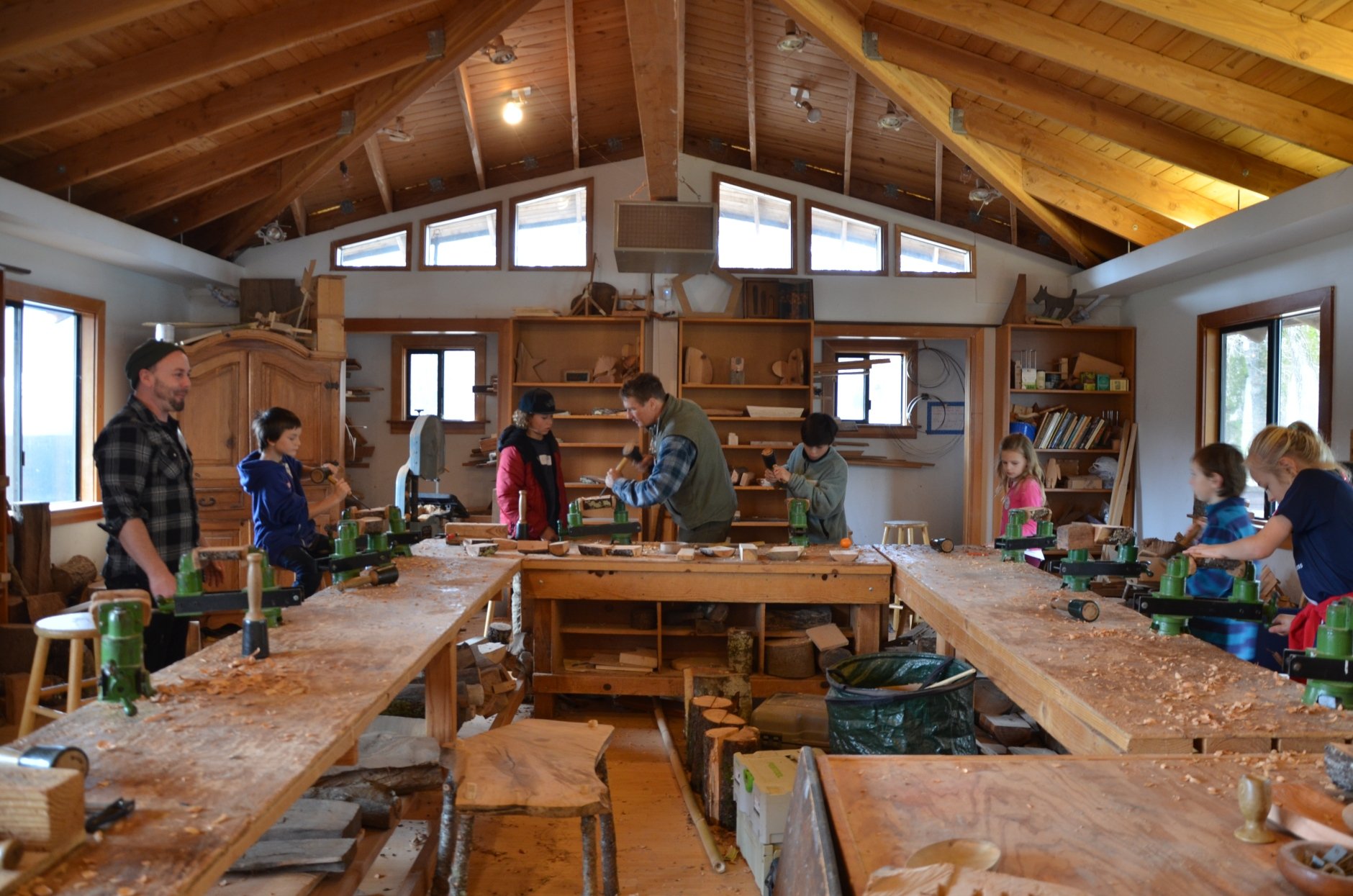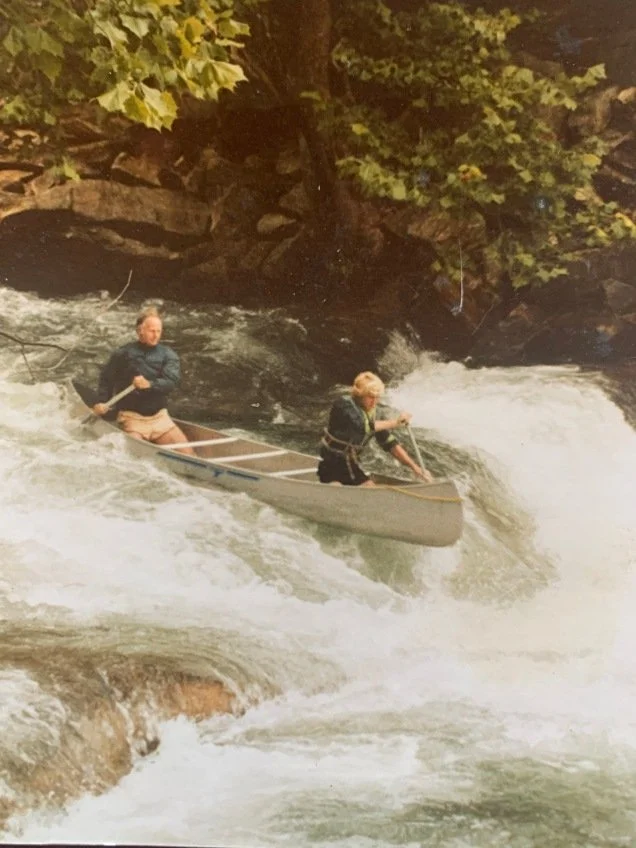Meet Adam Neale, Mentor and Maker
Adam Neale, Marin Waldorf School’s woodwork and outdoor education teacher, has always had a fondness for making things. He brought that gift, along with his genuine kindness and affability, to Marin Waldorf School over a decade ago, and today is one of the most beloved teachers on campus. An outdoor enthusiast and sportsman, he is a veteran of many MWS class trips, as well as an alumni parent and father to twin girls.
In the interview below, Mr. Neale tells us about his childhood in Miami, first-day jitters as the new MWS woodwork teacher, and (as you hoped!) how he met his wife, MWS director Megan Neale.
What was your childhood like?
I grew up in Miami, Florida. I loved it. I was really into the natural world, being outside all the time, being on the water, in the woods, in the mangrove swamps. That’s where I loved to spend my time.
My parents really enjoy being outside too. My mom studied marine biology. My dad was into fishing. They loved bird-watching. We spent our weekends out and about.
I’ve always liked making things. One of my first memories of woodworking was from summer camp in North Carolina. We dug up these little sassafras trees and I made a cane with the wood. I spent so much time working on that walking stick—and it’s funny to think it’s the same thing I do today, something that I was really drawn to as a child. Now I work surrounded by all these sticks! It’s endless what you can do with that stuff.
Young Adam Neale working on his sassafras stick.
Canoeing in North Carolina as a teen.
I went to a high school that had a week in the wintertime where you could take a class and make things, it was called Intersession. I made a fishing rod. There was a teacher and a fisherman, and he had kits for putting the guides on a rod. I never forgot that either.
You’re into fishing too, right?
Yeah, I’m into fishing too. I just made another fishing rod during the pandemic. I tie my own flies.
Adam Neale and Megan Neale in 1990.
How did you find your way from Florida to California? Were there stops in between?
I met Megan at a wedding in LA. She had decided that she wanted to live in Miami before I met her. I was living in Phoenix, Arizona, at the time. I told her I needed a ride from Phoenix to Miami to visit my parents—because I liked her. She was living in Marin and had just graduated from UC Santa Barbara, and she came through Phoenix to pick me up on the way to Miami. Our first date was driving across the country.
Later, she got into graduate school in Colorado. I ended up going with her, and it changed my life in a big way. I thought I would live in Miami forever. And then I was the Florida guy who moved to the mountains! I’d seen snow one time before I moved to Colorado. It was freezing cold.
I got a construction job with a really good carpenter who took the time to show me how to use tools and really do things right. I was grateful for that. Megan was a junior high teacher. Later I taught snowboarding, I taught fly fishing, and I was a raft guide.
Were these your first teaching jobs?
I actually started to teach at the camp where I got into woodworking. I was a camp counselor there, and I taught canoeing and whitewater rafting. So I had quite a bit of experience teaching kids at that point. I had really good mentors, people who taught me, so it was easy to teach what they had showed me.
We bought a house, and then we had twin daughters. That’s when we decided we needed to be around family, so we moved here.
Adam Neale fishing with his twin daughters.
How did you end up at Marin Waldorf School?
I was looking to get back into surfing, and I went to see a surfboard for sale at someone’s house. His wife ran a Waldorf preschool from their home, and their daughter went to Marin Waldorf School—she was a few years older than our daughters. Our daughters were just about the right age to start preschool, so they started going there, and we became very interested in Waldorf education.
When our daughters started at Marin Waldorf School, I was doing construction, working with a friend. The woodworking teacher’s daughter was in the same class as my daughters, and we were good friends. I would help him out in class sometimes. A few years later, the next woodworking teacher left unexpectedly and the school asked if I wanted to take the class. I said sure! I jumped in midyear.
Was it challenging?
Very! I’ll never forget the first day—I don’t think I’ve ever been so nervous in my life. I was nervous for so long—even on the outdoor ed hikes! I felt a lot of responsibility. What am I going to teach these kids? The people here are so bright, there’s such a high standard, so I felt I had to live up to that. [Current 8th grade teacher] Ms. Deason was our class teacher, so that was the standard that had been set.
My daughters were in fifth grade when I took the woodworking position, and that’s the first year of woodworking in the curriculum, so I taught my own daughters. I think I overcompensated by ignoring them. And they felt weird calling me “Dad,” so they called me “Mr. Neale.” Hearing “Mr. Neale” in their voices was always funny. But it was great. They’re very easy-going.
It’s surprising that you were nervous because you have a good, natural connection with the kids.
It’s an interesting position I’m in because the students have something in front of them that they’re working on. I give them the space to create stuff, and I get out of the way. They are very open. A lot of conversation comes naturally in that space.
And what about outdoor education, which you also teach?
That’s another place where I’m creating space, trying to help the kids feel comfortable outside. That’s my main goal: to connect them.
I got a degree in environmental studies. It was a bachelor of arts degree, so I studied a lot of philosophy behind the environmental movement. I always wanted to affect change for the environment, but I always wanted to do it on an individual level. I felt that was more my style, because I have a peacemaker side to my personality, where I connect with people and I want to understand them. So my idea was to be an outdoor educator to connect kids to the environment so they, in turn, would want to do the right thing for the planet.
That’s what I feel the Marin Waldorf School outdoor education program is about. Number one, making kids feel comfortable outside, so they want to go outside, so they see the value of it, without telling them that directly. There’s another word for it: coyote mentoring. In this philosophy, you’re bringing kids along but not telling them exactly what you’re doing—by playing games, having moments where you go outside and try to be as quiet as you can to listen to the birds—but what you’re teaching them is how to be self-reflective. Once they get quiet, they start to notice things about themselves while they’re trying to notice things outside. Trying to do that with young teenagers is really a challenge.
We’re so blessed to be surrounded by open space here. Trying to imagine what ancestors, what native people, the people who were here a long time ago were doing and connecting with that as well.
In the Andes in Peru.
At the North Platt River.
What about class trips?
Again, it’s that experiential education. It was a big part of my education growing up—I learned most by doing—and I traveled a bunch when I got out of school. I always pushed myself on those trips. Academics are important, but putting that to practical use, seeing the skills they developed in the classroom and the social fabric that they have, then they get to go out into the world. I’ve heard a lot of different compliments from hosts for our groups who say, these kids are just amazing.
The first five or six years, I never went on any trips. I went as a parent. But slowly, once my girls graduated, I start going on class trips. Iv’e been to Hawaii with Kathy Darcy’s class—that was an incredible trip. I went to Colorado, Arizona, the Four Corners area twice. I did the Eel River with Gail. They all were special. I went to Boston with Ms. Jackson.
There are so many moments I remember, like traveling across the country on a train with Rising’s class and watching the kids interact with the conductor. It was so neat to see kids who were so polite and who weren’t afraid to put themselves out there and talk to people.
Any trips in particular that stand out?
It’s hard to say. Every one! I’ve been so lucky.
Interview by Julie Meade. This interview has been edited and condensed for clarity.






